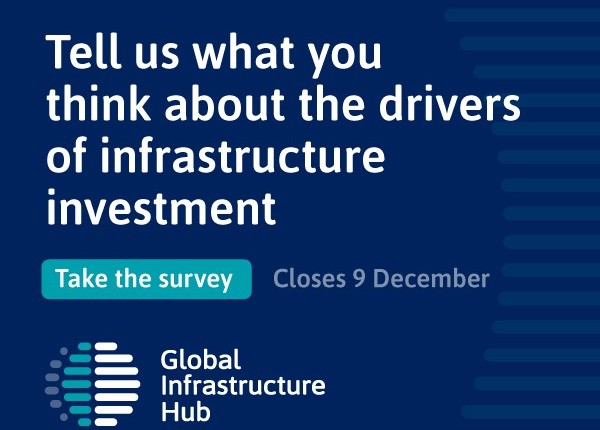928 results found
Featured results



More results
This special report is the world’s first comprehensive study of how to transition to a net zero energy system by 2050 while ensuring stable and affordable energy supplies, providing universal energy access, and enabling robust economic growth

InfraTracker is an open access tool that shows how much governments invest in infrastructure, and how they allocate this investment. It is the first tool of its kind and scale to be developed with the cooperation of G20 governments.
The Leaders' Declaration from the New Delhi G20 Leaders' Summit of 9-10 September 2023

To increase understanding and improve the consideration of circular infrastructure, the GI Hub has formed a Circular Economy in Infrastructure Action Group that includes global, senior leaders in circular economy and infrastructure across the public and private sector.
Read more about Infrastructure Futures, our new report looking at the key megatrends with the potential to disrupt the industry through to 2050.
The GI Hub wants to hear your views on the policies and practices that enable greater investment in infrastructure.
The Guidance Note, developed by the GI Hub in collaboration with Cambridge Economic Policy Associates Limited (CEPA), identifies lessons learned from various existing NIBs in both emerging markets and high-income countries through 11 case studies which explore different NIBs that have existed from 1945.
The Output Specifications for Quality Infrastructure Reference Guide, helps governments to operationalise the definition of Quality Infrastructure Investment agreed on by G20 nations.
GI Hub is today releasing new analysis of investment data from more than 250 long-term infrastructure plans across 25 G20 economies.
Private investment in infrastructure through primary market transactions remains low at around US$100 billion per year and has been declining over the past decade according to a new Global Infrastructure Hub (GI Hub) report, Infrastructure Monitor 2020.
The GI Hub has today published Infrastructure Monitor 2023. This year’s edition reveals the mixed state of private investment in infrastructure, where positive trends like strong investment, growing use of sustainable finance, and resilient financial performance exist alongside challenges like low levels of capital raised and persistent disparities between high-income countries and other countries.
Infrastructure Monitor is the GI Hub's annual flagship report on the state of investment in infrastructure. The 2022 report examines global private investment in infrastructure projects, infrastructure investment performance, availability of private capital and the role of MDBs in private investment in infrastructure.
Cross-border infrastructure is essential for connectivity. The GI Hub has created a reference guide that presents key learnings and global practices for successful cross-border projects, drawing from a comprehensive literature review, analysis of case studies and the input of international experts in cross-border projects.
The Global Infrastructure Hub (GI Hub) has now signed a consultancy contract for the development of a reference tool to address inclusion in large infrastructure projects.
The GI Hub today launches a shorthand cost-benefit analysis tool for analysing the environmental, social, and economic (ESE) benefits of bus transport projects.
Introducing a new professional training program for developing and delivering infrastructure for equal access, affordability, and economic empowerment.
G20 Leaders met in New Delhi on 9-10 September 2023. The Leaders’ Declaration reflects an ongoing focus on sustainable and inclusive economic growth, of which infrastructure is a key part.
This chapter discusses the impact of climate events on various types of digital infrastructure.


Co-financing provide a supportive enabling environment that minimises risk exposures, catalysing private co-financing for infrastructure in middle- and low-income countries.


The report describes eight nutrition-sensitive approaches for achieving greater impacts on early child nutrition. Results framework indicators are proposed to support monitoring and evaluation of nutrition-sensitive investments in water management and irrigation.





 Infrastructure and Circular Economy
Infrastructure and Circular Economy














